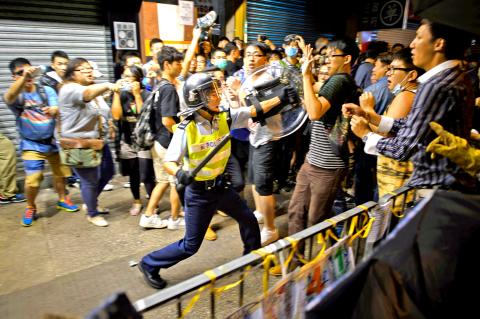Hong Kong pro-democracy protesters accused police of using excessive force against them after violent clashes yesterday, as a senior politician said weeks of rallies have reached a “critical moment.”
Dozens of police equipped with riot gear pushed into a crowd of angry demonstrators in the Mong Kok district early yesterday, striking at them repeatedly with batons.
Twenty people were injured in a fourth night of clashes between protesters demanding free elections for the semi-autonomous territory and police trying to restore traffic to the major Mong Kok thoroughfare that the demonstrators have brought to a standstill.

Photo: AFP
The spike in violence comes after three weeks of largely peaceful pro-democracy rallies and road blockades that paralyzed key parts of the Asian financial hub.
At a press conference at the Mong Kok camp yesterday, organizers blasted police for a response that left protesters with head wounds, fractures and bruises, with others carried away on stretchers.
Police said in a statement they used “minimum force” as protesters “suddenly attempted to charge” their cordon lines.
Talks between student protest leaders and government officials are still set to go ahead tomorrow, but with little common ground between the two sides, there are slim hopes of a breakthrough.
China insists that candidates for the 2017 vote for Hong Kong’s leader must be approved by a pro-Beijing committee — a condition protesters decry as “fake democracy.”
Hong Kong Chief Executive Leung Chun-ying (梁振英) has warned that Beijing authorities have no intention of backing down.
Hong Kong Secretary of Finance John Tsang (曾俊華) yesterday urged demonstrators to retreat.
“I was young before and I have taken part in various student movements,” he wrote on his blog. “Retreating is not an easy decision. It takes a lot of bravery. I still believe that you can take the courage to make right decisions at this critical moment.”
Protest leaders told the crowds in Mong Kok that a three-day “cooling off period” could help lower simmering tensions between police and demonstrators.
“Those who are sick and tired, please go home for 72 hours to have a cooling-off period,” said Ed Chin (錢志健) of Occupy Central, one of the main protest organizers.
Christian pastor Fung Chi-wood (馮智活) said that the police, for their part, should pledge a lighter-handed approach.
Some protesters at Mong Kok wore hard hats and makeshift protective gear fashioned out of household items. Posters stuck up around the camp read: “Calm down. Don’t forget our original purpose.”
The government information service said 20 people involved in protest activities had been injured between 10pm and 6am overnight from Saturday to yesterday, but would not specify how many were demonstrators or police officers, the extent of the injuries, or if they all took place in the Mong Kok area.
One volunteer medic said she had seen four people with head injuries with “serious bleeding,” as well as a back fracture.
“They hit us without any reason when we were standing behind the roadblock. I was hit by a police stick four or five times,” protester Jackie said as he sat at a local hospital with his head bandaged. “There was no aggressive action on our side.”

US President Donald Trump yesterday announced sweeping "reciprocal tariffs" on US trading partners, including a 32 percent tax on goods from Taiwan that is set to take effect on Wednesday. At a Rose Garden event, Trump declared a 10 percent baseline tax on imports from all countries, with the White House saying it would take effect on Saturday. Countries with larger trade surpluses with the US would face higher duties beginning on Wednesday, including Taiwan (32 percent), China (34 percent), Japan (24 percent), South Korea (25 percent), Vietnam (46 percent) and Thailand (36 percent). Canada and Mexico, the two largest US trading

AIR SUPPORT: The Ministry of National Defense thanked the US for the delivery, adding that it was an indicator of the White House’s commitment to the Taiwan Relations Act Deputy Minister of National Defense Po Horng-huei (柏鴻輝) and Representative to the US Alexander Yui on Friday attended a delivery ceremony for the first of Taiwan’s long-awaited 66 F-16C/D Block 70 jets at a Lockheed Martin Corp factory in Greenville, South Carolina. “We are so proud to be the global home of the F-16 and to support Taiwan’s air defense capabilities,” US Representative William Timmons wrote on X, alongside a photograph of Taiwanese and US officials at the event. The F-16C/D Block 70 jets Taiwan ordered have the same capabilities as aircraft that had been upgraded to F-16Vs. The batch of Lockheed Martin

China's military today said it began joint army, navy and rocket force exercises around Taiwan to "serve as a stern warning and powerful deterrent against Taiwanese independence," calling President William Lai (賴清德) a "parasite." The exercises come after Lai called Beijing a "foreign hostile force" last month. More than 10 Chinese military ships approached close to Taiwan's 24 nautical mile (44.4km) contiguous zone this morning and Taiwan sent its own warships to respond, two senior Taiwanese officials said. Taiwan has not yet detected any live fire by the Chinese military so far, one of the officials said. The drills took place after US Secretary

THUGGISH BEHAVIOR: Encouraging people to report independence supporters is another intimidation tactic that threatens cross-strait peace, the state department said China setting up an online system for reporting “Taiwanese independence” advocates is an “irresponsible and reprehensible” act, a US government spokesperson said on Friday. “China’s call for private individuals to report on alleged ‘persecution or suppression’ by supposed ‘Taiwan independence henchmen and accomplices’ is irresponsible and reprehensible,” an unnamed US Department of State spokesperson told the Central News Agency in an e-mail. The move is part of Beijing’s “intimidation campaign” against Taiwan and its supporters, and is “threatening free speech around the world, destabilizing the Indo-Pacific region, and deliberately eroding the cross-strait status quo,” the spokesperson said. The Chinese Communist Party’s “threats